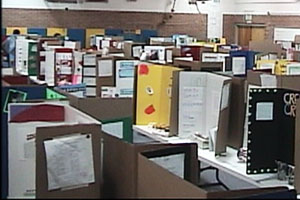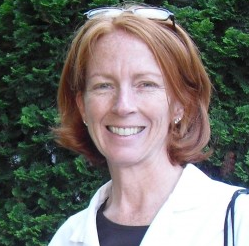How is a Science Fair Judged and Tips for Science Fair Success
 Dr, Maille Lyons, The Science Fair Coach
Dr, Maille Lyons, The Science Fair Coach
How is a Science Fair Judged?
It might surprise you to learn that there are no rules on how a science fair must be judged. In an ideal situation, all science fair judges would review all of the projects, and then interview all of the students, and then come to an agreement on the ranking of the overall best projects. This, however, is generally not going to happen because of time constraints and limits on the number of judges available. The next best option is to have groups of judges assigned to natural groupings of projects. For example, some judges would only judge 5th grade projects while others would only judge 6th grade projects. Alternatively, some judges would only judge biology projects, while others would only judge physics projects. In both cases, all judges evaluate all projects in their group and come to a consensus regarding the rankings for that type of project. Realistically, it is more common that each judge evaluates a randomly assigned group of projects, looking to identify the best 2 or 3 projects from their grouping. Then other judges, or head judges, evaluate the identified projects against each other. In larger fairs, sometimes the judges identify many great projects, and then discuss each one to narrow the list down to the top number of spots for awards.
For students, it is less important to know how the judging will be coordinated and more important to know if the judging takes place with or without an interview. Some fairs interview all students, whereas other fairs only interview students whose projects have been identified as potential winners, and then others have no interview at all. In all cases, the science fair project backboard must be able to communicate the project details without the student there to explain them. The best way to check if your project board gets that job done, is to ask an adult that is not familiar with your project (e.g. neighbor, friend’s parent, other teacher, coach, etc.) to read your board and figure out what you did.
 Tips for success
Tips for success
Generally, judges are nice people, but it only takes one “mean” judge to ruin a student’s science fair experience. Overall, try not to read too much into body language. Scientists, as a group, are not known for their social skills. For example, sometimes a judge decides the project is really good, but they need to move on to evaluate all the projects they have been assigned, so they abruptly end the interview and go to the next project. Other times, the judge has decided the project is not in the top tier of projects, comments the student did an excellent job presenting it, because they are just trying to be nice, and then moves on. Preparation is the key to increasing you chances of an enjoyable and successful experience.
Here are 5 tips for the science fair judging interview:
- Greet your judge – stand up, look at them, shake their hand, and say “It is nice to meet you, my name is…” If you are particularly shy, this will be hard for you, so you will need to practice it many times.
- Be able to summarize your project in 2 minutes or less, but also have a longer, more detailed presentation ready in the event that the judge does not have any immediate questions or time constraints.
- Think of your presentation as telling the judge a story, highlighting the creative or unexpected aspects. If you encountered any problems along the way that you had to solve, describe that process. Judges love the problem solving aspects because it shows you did some thinking as opposed to just following directions from a project website or book.
- Understand why your project is important, or exciting, or new. Scientists start every science paper by putting their new work into the context of what we already know. Balance your knowledge with enthusiasm.
- Dress neatly. While it is possible to win while wearing in ripped jeans and lose while wearing dress clothes, the impression you leave on each judge is critical in determining if they will advocate for your project in the judging room. Your appearance will factor into that impression, even if it is ever so slight. Therefore, find the least dressing thing that you will not fidget in and put it on for a few hours.
About Dr. Maille Lyons
 My name is Maille, which is Gaelic and pronounced “Molly”. I won my first science fair in 6th grade at Joseph Case Junior High School in Swansea, Massachusetts. My project was called “The effect of acid rain on house plants”. As luck would have it my science teacher (Mr. Fonseca) was also my soccer coach. I loved doing projects and did a science fair project every year (required or not) up through my senior year. I enjoyed it so much, that I eventually pursued a career in science and now get to do the grown-up equivalent of science fair projects almost every day. Today I am environmental microbiologist specializing in aquatic bacteria (which means I can only respond to posts at night and on week-ends). I have a Bachelor of Science Degree in Biology from the University of Massachusetts (UMD), a Master’s Degree in Biology from University of California, Los Angeles (UCLA), a post-graduate certification in Epidemiology and Biostatistics from Drexel, and a Ph.D. in Oceanography from the University of Connecticut (UCONN).
My name is Maille, which is Gaelic and pronounced “Molly”. I won my first science fair in 6th grade at Joseph Case Junior High School in Swansea, Massachusetts. My project was called “The effect of acid rain on house plants”. As luck would have it my science teacher (Mr. Fonseca) was also my soccer coach. I loved doing projects and did a science fair project every year (required or not) up through my senior year. I enjoyed it so much, that I eventually pursued a career in science and now get to do the grown-up equivalent of science fair projects almost every day. Today I am environmental microbiologist specializing in aquatic bacteria (which means I can only respond to posts at night and on week-ends). I have a Bachelor of Science Degree in Biology from the University of Massachusetts (UMD), a Master’s Degree in Biology from University of California, Los Angeles (UCLA), a post-graduate certification in Epidemiology and Biostatistics from Drexel, and a Ph.D. in Oceanography from the University of Connecticut (UCONN).
Dr. Lyons shares science fair tips, tricks and advice on her blog, Science Fair Coach.




“Scientists, as a group, are not known for their social skills.” Is this a scientific fact or an empirical observation?!
Either way – thanks for having the guts to ‘warn’ kids. They really do need to realize that sometimes the judges can be very quirky.
It is an observation by the author – who is a full time “real” scientist herself. We are just all a little quirky – but there is nothing wrong with that! Glad you enjoyed the article.